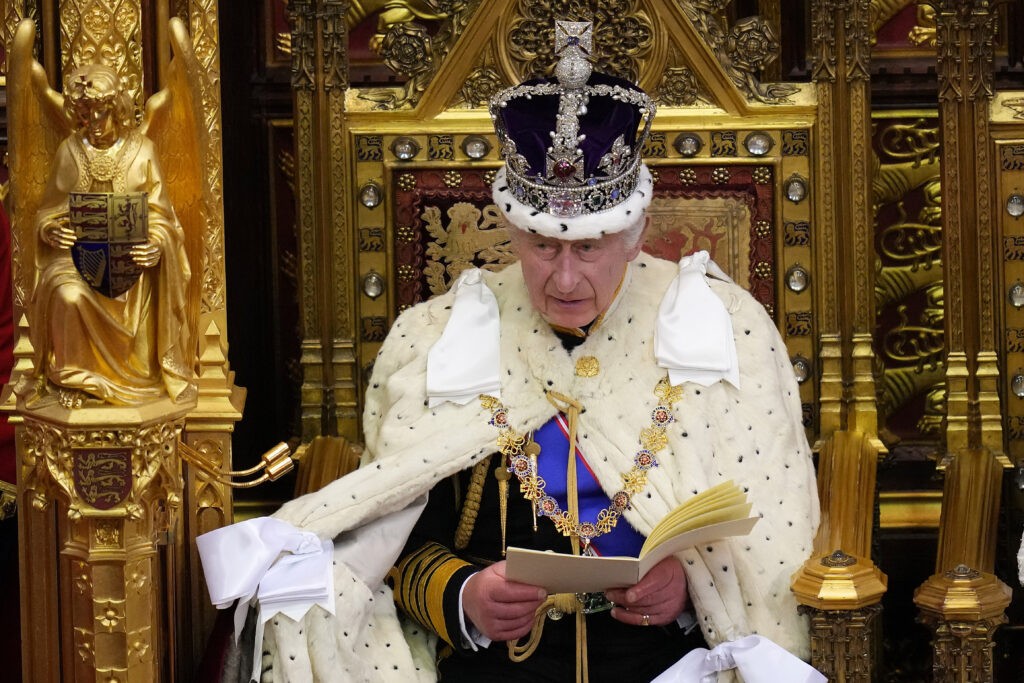07/11/2023
07/11/2023

LONDON, Nov 7, (Agencies): King Charles, in his first-ever address to Parliament, expressed the UK's unwavering commitment to fostering peace and stability in the Middle East. The historic King's Speech, marking the first by a male British monarch in over seven decades and coinciding with the impending general election, outlined a comprehensive agenda comprising 20 key measures, spanning various areas such as energy resources, law enforcement, and football governance.
The King condemned acts of terrorism against Israel, emphasizing the need for the UK to collaborate closely with international allies in support of Ukraine, the reinforcement of NATO, and addressing paramount security concerns. His commitment extended to facilitating humanitarian aid to Gaza and promoting the cause of peace and stability in the Middle East.
Additionally, King Charles announced initiatives to advance the construction of a national Holocaust Memorial, including the necessary legal amendments to overcome a century-old law that had impeded the project's progress. These changes would also authorize the use of public funds to construct and operate the memorial, emphasizing the government's dedication to combatting anti-Semitism and ensuring the memory of the Holocaust endures.
The King, while paying tribute to his late mother, Queen Elizabeth, acknowledged the formidable challenges posed by the enduring impact of the COVID-19 pandemic and the ongoing conflict in Ukraine. He emphasized the government's determination to make challenging yet vital long-term decisions to transform the nation positively. The government's top priorities include bolstering economic growth and ensuring the long-term well-being and security of the British populace.
Regarding immigration, King Charles reiterated the commitment to implementing the Illegal Migration Act and international agreements to curb perilous and unlawful Channel crossings. The government aims to regain control over immigration decisions and prevent criminal organizations from dictating who enters the country.
Legislation designed to enhance the UK's energy security and reduce dependence on volatile international energy markets and unfriendly foreign regimes was highlighted. The proposed bill seeks to facilitate the licensing of new oil and gasfields while promoting the transition to a net-zero carbon footprint by 2050, without unduly burdening households. It further aims to attract substantial investments in renewable energy sources and improve grid connections, building on the UK's commendable track record of decarbonization.
Additional legislative measures included creating a "smoke-free generation" by restricting tobacco sales to those aged 14 and below, as well as regulating the sale and marketing of e-cigarettes to minors. Furthermore, a new independent football regulator would be established to oversee the financial flows from the Premier League down to lower-tier clubs.
The Criminal Justice Bill addresses issues such as mandatory criminal sentencing hearings and empowering the police to enter properties without court warrants to recover stolen goods, particularly those tracked through GPS technology.
The King's ceremonial arrival, escorted by Queen Camilla and guarded by the Household Division cavalry, was a grand affair. Traditional customs, such as the ceremonial "hostage" MP at Buckingham Palace to ensure the King's safety and security searches for explosives in the Palace of Westminster's basement, were observed. The symbolic door closure by Black Rod at the House of Commons marked the separation of parliament from the monarchy.
The King's Speech signifies the commencement of a new parliamentary session, outlining the legislative agenda for the coming year. However, with the Conservative Party trailing in the polls ahead of the 2024 general election, the fate of much of the proposed legislation may remain uncertain.
Commenting on the political landscape, Richard Carr, an associate professor in public policy and strategy at Anglia Ruskin University, noted the challenges faced by Chancellor Rishi Sunak and the potential implications for the Conservative Party in the upcoming election, as public sentiment appears to waver.


